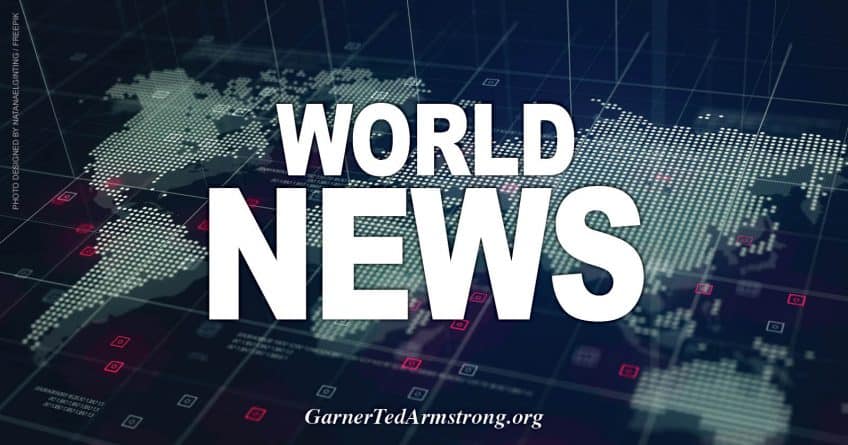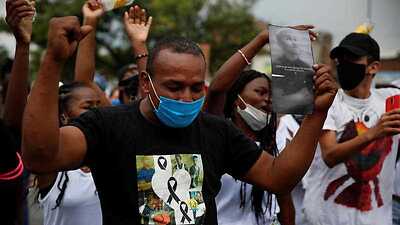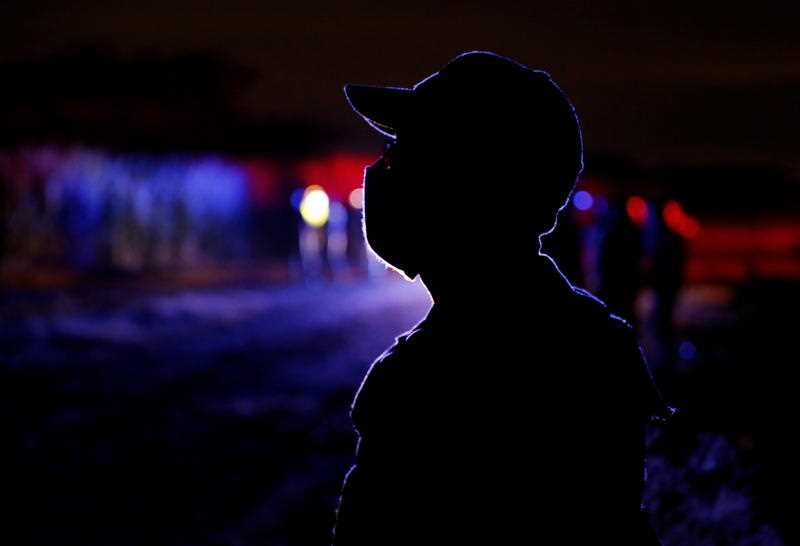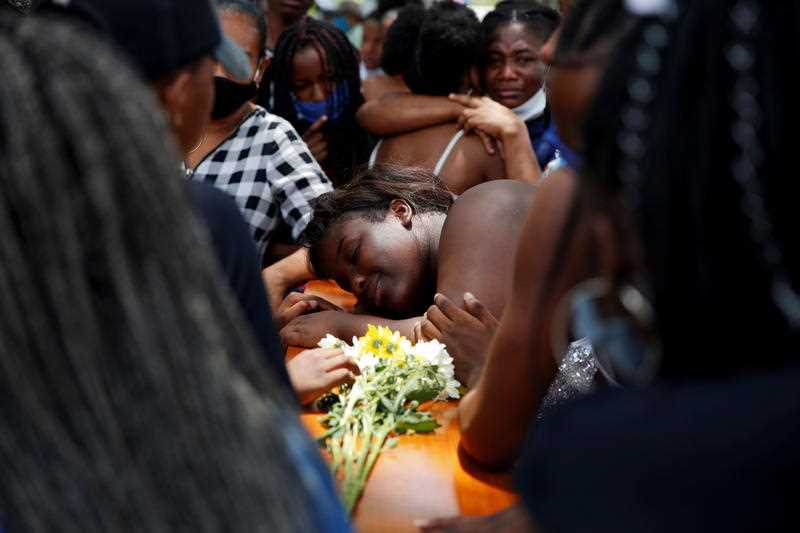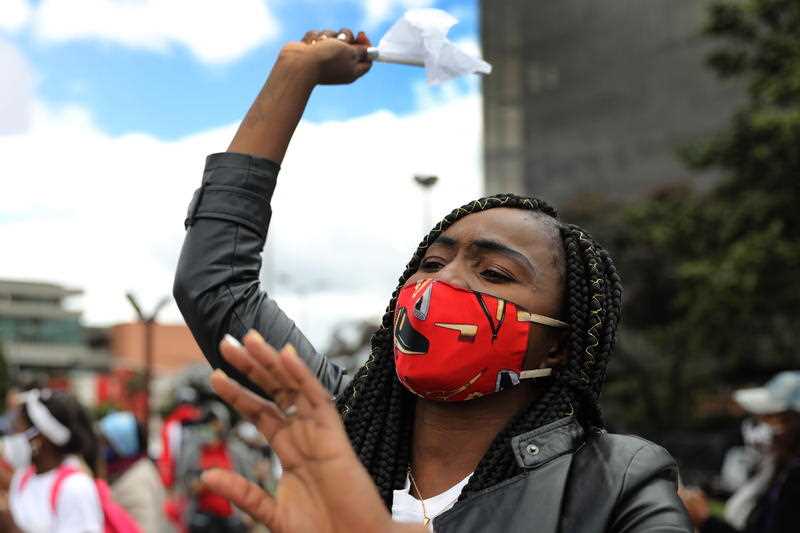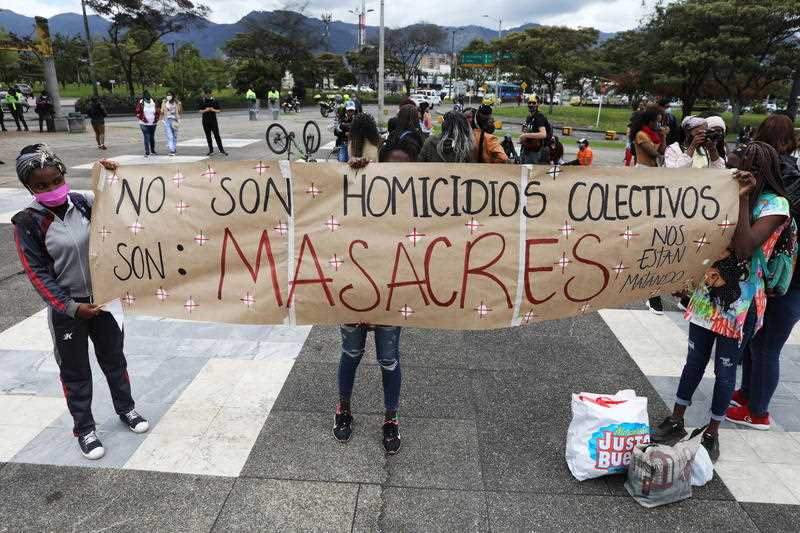Demonstrators participate in a protest to demand justice after the massacre of five minors in Cali, Colombia, 19 August 2020. Source: AAP
Experts say the “horrific” spate of violence is no longer shocking as the Latin American country, hit hard by the coronavirus pandemic, continues to negotiate a fragile peace deal aimed at ending its decades-long civil war.
For the last two weeks, Colombia has been rocked by a wave of massacres that have killed at least 42 people, according to police.
The massacres, defined as the murder of three or more people in a single act of killing, have taken place across the Latin American country, from the western state of Narino to the state of Arauca on the eastern border with Venezuela.
The first of the massacres is thought to have happened on 11 August in the city of Cali when five teenage boys were killed in a sugar cane field.
Since then, there have been at least eight other killings. On 21 August, the bodies of six people were found lying in woodland in the Tambo municipality of the southern Cauca region.
And on 28 August, hooded gunmen killed three people, including a 13-year-old, near the town of Andes in the country’s north-west.
Regional police commander Colonel Ever Gomez reportedly said the gunmen entered a farm and opened fire, killing two people instantly. The third victim died in hospital.
The latest killing was the ninth in two weeks and brings the death toll since 11 August to at least 42.
Alberto Posso, from Ecuador, is an economics professor at Melbourne’s RMIT University, and director of the university’s Centre for International Development.
He described the recent spate of violence in Colombia as “horrific” but “no longer surprising”.
“Unfortunately, this is something that is not all too uncommon in the Latin American region more broadly,” Prof Posso told SBS News.
“I’m afraid Colombia is having one of those common episodes in a country that is unfortunately used to violence … I want to be more shocked.”
Last month, the United Nations’ peace mission in Colombia said it had already documented 33 massacres since the beginning of the year. Local conflict watchdog Indepaz said as of 25 August, that number could be as high as 46.
Among the victims are more than 100 social leaders and human rights defenders, according to Afro-Colombian organisation member Danelly Estupinan, whose account was published by Amnesty International in June.
But what strikes Prof Posso is how little is known about the recent killings.
On Friday, President Ivan Duque and Attorney General Francisco Barbosa announced the arrest of two of the alleged perpetrators behind the 11 August killing of five teenage boys. A third suspect is on the run.
Mr Barbosa said the boys were murdered “in an act of total barbarism”.
“It seems to me that the authorities are somewhat failing in trying to figure out what is behind this,” Prof Posso said.
“To a lot of people, this ineptitude is shocking, but unfortunately it’s something that is also not too uncommon in Latin America.”
What is driving the massacres?
As authorities begin an investigation, various claims are emerging as to what is driving the recent massacres.
Some local media outlets and human rights groups have reported so-called ‘COVID Death Squads’ are allegedly targeting those who are breaching virus restrictions during the pandemic.
Mr Duque first imposed a national lockdown to control the spread of COVID-19 in late March.
According to a report published by human rights organisation Human Rights Watch on 15 July, numerous armed groups went on to impose their own curfews, quarantines and other measures in at least 11 of the 32 departments of Colombia that have historically been abandoned by the government.
HRW claims these groups have threatened, murdered and attacked those they believe are not complying with the rules. According to a local university report, at least 30 people have been murdered for breaking quarantine.
“In various communities throughout Colombia, armed groups have violently imposed their own rules to prevent the spread of COVID-19,” Human Rights Watch Americas director Jose Miguel Vivanco said.
“This brutal social control reflects the historical failure of the state to establish a significant presence in remote areas of the country to protect communities at risk.”
The massacres come as the country recorded the highest number of COVID-19 deaths per capita in recent weeks at 43.1 deaths per million people, according to data from the John Hopkins University.
The country has over 615,000 active infections, and has recorded just over 19,660 deaths.
Prof Posso said while the death squad theory is “possible”, he believes it is unlikely.
“I think right now, Latin America is the epicenter of the virus, and it seems like people are taking this seriously. But at the same time, the economic hardship associated with these lockdowns is generally understood,” he said.
President Duque has accused armed groups financed by drug trafficking of being behind the current wave of massacres. He has been criticized for terming them “collective homicides”.
It is one of the biggest spikes of violence since the signing of a peace agreement with the country’s largest rebel group, the Revolutionary Armed Forces of Colombia (Farc), in 2016 that aimed to end its decades-long civil war.
But the country still remains roiled by turf wars between armed groups competing for territorial control, including dissident Farc members who rejected the peace deal, National Liberation Army (ELN) guerillas, paramilitary successor groups, drug cartels and the military.
“A turf war is probably the most likely thing, here,” Prof Posso said. “But at this stage, it is also true to highlight that this is only speculation.”
Ultimately, Prof Posso said the recent killings are taking place in a politically polarized country that is rife with inequality.
Many critics have blamed Mr Duque, who inherited the government’s peace agreement deal when he took office two years ago, for not doing enough to implement it.
“This deal, from a historical perspective, was well recognized by the international community,” Prof Posso said.
“The end of Farc did lead to some improvements, but there is still economic violence, a lot of social violence – and inequality that is ultimately fueling this violence.
“Latin America is polarized when it comes to politics, and that division is right now on ice because of the pandemic. We have to remember that as long as inequality is high, these divisions are going to drive people and polarize people politically and economically in all sorts of directions.”
For now, Prof Posso said a transparent investigation into the recent killings will be vital for Colombia, as a recent member of the Organisation for Economic Co-Operation and Development (OECD).
“Colombia is keen to highlight itself as a country that has graduated from developing to developed,” he said.
“If it is going to do that, even amidst the situation with the pandemic, it has to show that due process is being followed.
“Then we can ask the question, is this driven by politics, or is it something else?”
Additional reporting by AFP.
[Disclaimer]

